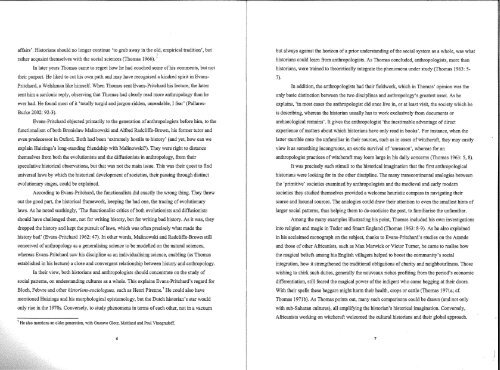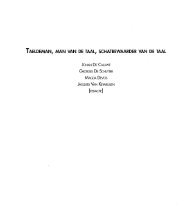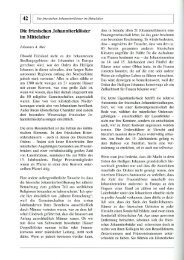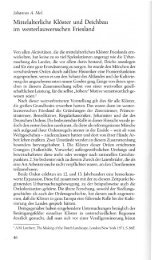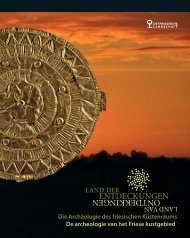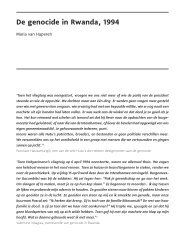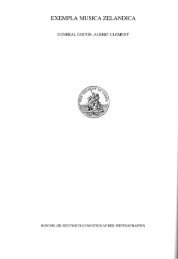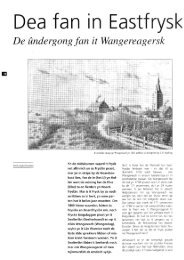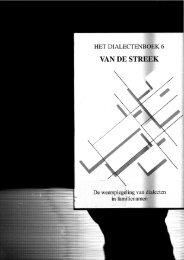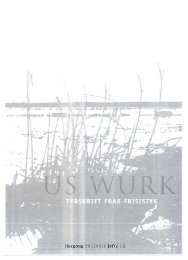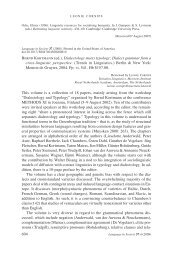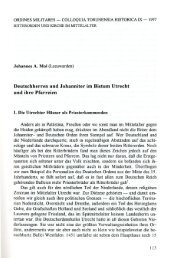Antropologen, historici en de hartslag van het archief
Antropologen, historici en de hartslag van het archief
Antropologen, historici en de hartslag van het archief
You also want an ePaper? Increase the reach of your titles
YUMPU automatically turns print PDFs into web optimized ePapers that Google loves.
affairs'. Historians should no longer continue 'to grub away in the old, empirical tradition', but<br />
rather acquaint themselves with the social sci<strong>en</strong>ces (Thomas 1966).<br />
In later years Thomas came to regret how he had couched some of his comm<strong>en</strong>ts, but not<br />
their purport. He liked to cut his own path and may have recognised a kindred spirit in E<strong>van</strong>s<br />
Pritchard, a Welshman like himself. Wh<strong>en</strong> Thomas s<strong>en</strong>t E<strong>van</strong>s-Pritchard his lecture, the latter<br />
s<strong>en</strong>t him a sardonic reply, observing that Thomas had clearly read more anthropology than he<br />
ever had. He found most of it 'totally turgid and jargon-ridd<strong>en</strong>, unreadable, I fear' (Pallares<br />
Burke 2002: 92-3).<br />
E<strong>van</strong>s-Pritchard objected primarily to the g<strong>en</strong>eration of anthropologists before him, to the<br />
functionalism of both Bronislaw Malinowski and Alfred Radcliffe-Brown, his former tutor and<br />
ev<strong>en</strong> pre<strong>de</strong>cessor in Oxford. Both had be<strong>en</strong> 'extremely hostile to history' (and yet, how can we<br />
explain Huizinga's long-standing fri<strong>en</strong>dship with Malinowski?). They were right to distance<br />
themselves from both the evolutionists and the diffusionists in anthropology, from their<br />
speculative historical observations, but that was not the main issue. This was their quest to find<br />
universal laws by which the historical <strong>de</strong>velopm<strong>en</strong>t of societies, their passing through distinct<br />
evolutionary stages, could be explained.<br />
According to E<strong>van</strong>s-Pritchard, the functionalists did exactly the wrong thing. They threw<br />
out the good part, the historical framework, keeping the bad one, the tracing of evolutionary<br />
laws. As he noted scathingly, 'The functionalist critics of both evolutionists and diffusionists<br />
should have chall<strong>en</strong>ged them, not for writing history, but for writing bad history. As it was, they<br />
dropped the history and kept the pursuit of laws, which was oft<strong>en</strong> precisely what ma<strong>de</strong> the<br />
history bad' (E<strong>van</strong>s-Pritchard 1962: 47). In other words, Malinowski and Radcliffe-Brown still<br />
conceived of anthropology as a g<strong>en</strong>eralising sci<strong>en</strong>ce to be mo<strong>de</strong>lled on the natural sci<strong>en</strong>ces,<br />
whereas E<strong>van</strong>s-Pritchard saw his discipline as an individualising sci<strong>en</strong>ce, <strong>en</strong>abling (as Thomas<br />
established in his lecture) a close and converg<strong>en</strong>t relationship betwe<strong>en</strong> history and anthropology.<br />
In their view, both historians and anthropologists should conc<strong>en</strong>trate on the study of<br />
social patterns, on un<strong>de</strong>rstanding cultures as a whole. This explains E<strong>van</strong>s-Pritchard's regard for<br />
Bloch, Febvre and other hisfori<strong>en</strong>s-socio!ogues, such as H<strong>en</strong>ri Pir<strong>en</strong>ne. 7 He could also have<br />
m<strong>en</strong>tioned Huizinga and his morphological epistemology, but the Dutch historian's star would<br />
only rise in the 1970s. Conversely, to study ph<strong>en</strong>om<strong>en</strong>a in terms of each other, not in a vacuum<br />
1 He nl80 m<strong>en</strong>tions an ol<strong>de</strong>r g<strong>en</strong>eration, with Gustave Glotz, Maitland and Paul Vinogradoff.<br />
6<br />
but always against the horizon of a prior un<strong>de</strong>rstanding of the social system as a whole, was what<br />
historians could learn from anthropologists. As Thomas conclu<strong>de</strong>d, anthropologists, more than<br />
historians, were trained to theoretically integrate the ph<strong>en</strong>om<strong>en</strong>a un<strong>de</strong>r study (Thomas 1963: 5-<br />
7).<br />
In addition, the anthropologists had their fieldwork, which in Thomas' opinion was the<br />
only basic distinction betwe<strong>en</strong> the two disciplines and anthropology's greatest asset. As he<br />
explains, 'in most cases the anthropologist did once live in, or at least visit, the society which he<br />
is <strong>de</strong>scribing, whereas the historian usually has to work exclusively from docum<strong>en</strong>ts or<br />
archaeological remains'. It gives the anthropologist 'the inestimable ad<strong>van</strong>tage of direct<br />
experi<strong>en</strong>ce of matters about which historians have only read in books'. For instance, wh<strong>en</strong> the<br />
latter stumble onto the unfamiliar in their sources, such as in cases of witchcraft, they may easily<br />
view it as something incongruous, an exotic survival of 'unreason', whereas for an<br />
anthropologist practices of witchcraft may loom large in his daily concerns (Thomas 1963: 5, 8).<br />
It was precisely such stimuli to the historical imagination that the first anthropological<br />
historians were looking for in the other discipline. The many transcontin<strong>en</strong>tal analogies betwe<strong>en</strong><br />
the 'primitive' societies examined by anthropologists and the medieval and early mo<strong>de</strong>m<br />
societies they studied themselves provi<strong>de</strong>d a welcome heuristic compass in navigating their<br />
scarce and lacunal sources. The analogies could draw their att<strong>en</strong>tion to ev<strong>en</strong> the smallest hints of<br />
larger social patterns, thus helping them to <strong>de</strong>-exoticise the past, to familiarise the unfamiliar.<br />
Among the many examples illustrating his point, Thomas inclu<strong>de</strong>d his own investigations<br />
into religion and magic in Tudor and Stuart England (Thomas 1963: 8-9). As he also explained<br />
in his acclaimed monograph on the subject, thanks to E<strong>van</strong>s-Pritchard's studies on the Azan<strong>de</strong><br />
and those of other Africanists, such as Max Marwick or Victor Turner, he came to realise how<br />
the magical beliefs among his English villagers helped to boost the community's social<br />
integration, how it str<strong>en</strong>gth<strong>en</strong>ed the traditional obligations of charity and neighbourliness. Those<br />
wishing to shirk such duties, g<strong>en</strong>erally the nouveaux riches profiting from the period's economic<br />
differ<strong>en</strong>tiation, still feared the magical power of the indig<strong>en</strong>t who came begging at their doors.<br />
With their spells these beggars might harm their health, crops or cattle (Thomas 1971 a; cf.<br />
Thomas 1971b). As Thomas points out, many such comparisons could be drawn (and not only<br />
with sub-Saharan cultures), all amplifYing the historian's historical imagination. Conversely,<br />
Africanists working on witchcraft welcomed the cultural historians and their global approach.<br />
7


